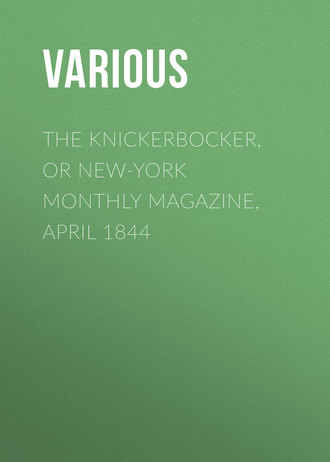 полная версия
полная версияThe Knickerbocker, or New-York Monthly Magazine, April 1844
‘The vulgar genteel are nervously cautious concerning every thing they say or do; they are ever alive to the dread of compromising their ‘gentility.’ At a ball—it was a charity-ball!—given at a fashionable watering-place, a pretty young woman, who was sitting by her mother, was invited by a gentleman to dance. He led her to a set; when, instantly, two ‘young ladies’ who were of it, haughtily, withdrew to their seats. ‘They had no notion of dancing in such company’—and with good reason. The young person was nothing more than the daughter of a wealthy and respectable tradesman of the place; while they—the two Misses Knibbs—were members of its resident small ‘aristocracy.’ The places they had vacated were good-naturedly filled by two ladies who had witnessed the proceeding, one of whom was the daughter, the other, the niece, of a nobleman. Their position was too well established to be compromised by dancing for a quarter of an hour in the same set with a respectable tradesman’s daughter; but the two Misses Knibbs were the daughters of a retired soap-boiler.’
⁂ We have numerous communications in prose and verse, several of them from favorite contributors, of which we shall make more particular mention in our next. Three pages of ‘Literary Record,’ although in type, are unavoidably omitted.
1
This route leads, among other villages, through that of Sevenoaks, famous as the place where Jack Cade and his rabble overthrew the forces of Stafford, in the very same year, (1450,) when Faust and Gutenberg set up the first press in Germany, and long, therefore, before Cade could have justly complained, as Shakspeare has made him do, that the Lord Say had ‘caused printing to be used’ in England, and ‘built a paper-mill.’ But who taxes the sun for his spots or Shakspeare for anachronisms? He who was born to exhaust and imagine worlds, cannot of course be denied some innocent liberties with chronology. The village in question, however, is more interesting to travellers from being in the vicinity of Knole, the fine old seat of the dukes of Dorset. The stranger is led here through long galleries garnished with furniture of the time of Elizabeth and hung with portraits which at every step recall names of the deepest historical interest. Who can ever forget that which hangs or hung over the door of Lady Betty Germaine’s chamber? It is Milton in the bloom of manhood, and the immortal epic seems to be just dawning on those mild and pensive features. One chamber, of sumptuous appointments remains, (so runs the legend,) as it was last tenanted by James I., no head less sapient or august having been since permitted to press the pillow. In another every thing stands as it was arranged for the reception of the second James, who forfeited, it seems, a luxurious lodging at Knole at the same time that he forfeited his crown. The name of Lady Betty Germaine, Swift’s friend and correspondent, connects the place with all the celebrities of the reign of Queen Anne. On emerging from the building we view the magnificent groves of the park, fit haunt for nightingales, though Becket is said to have driven them by an anathema from the neighborhood, because their songs interrupted his nocturnal meditations. But the memory of Thomas Sackville, Lord Buckhurst, (once proprietor of Knole,) the best poet of his time, and ‘the immediate father-in-verse of Spenser,’ sufficiently redresses the stigma of so churlish a proscription, and the nightingales may well claim perpetual franchise under sanction of a name to which the ancient inscription would apply:
Λί δὲ τεαὶ ζώουσιν ἀηδονες, ἡσιν ὁ παντωνἁρπακτὴρ Αὶδης ουκ επὶ χεῖρα βαλεὶ.Yet live thy nightingales of song: on thoseForgetfulness her hand shall ne’er impose.2
Dunum or Duna, sigifieth a hill or higher ground, whence Downs, which cometh of the old French word dun. Coke Lit. 235.
3
Parody of ‘Andromache:’ Racine’s first tragedy of any note.
4
Alluding to an epigram of Racine on d’Olonne and de Crequi, written to revenge himself for their attacks on ‘Andromache.’
5
Sub dio.—Hor.









